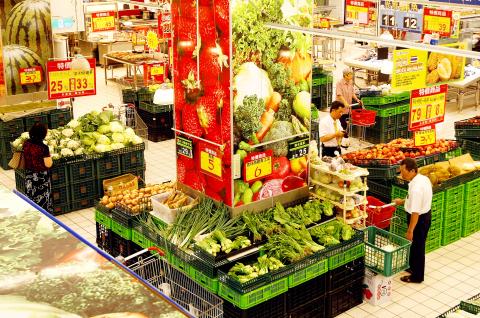The Taiwan Institute of Economic Research (TIER, 台灣經濟研究院) yesterday cut its GDP growth forecast for the nation this year from the 3.96 percent it forecast in January to 3.48 percent, citing weaker-than--expected growth in the first quarter.
The government’s decision to raise gasoline and diesel prices this month, as well as increase electricity rates next month, also made the institute raise its growth forecast for inflation to 1.98 percent, up 0.52 percentage points from the January forecast of 1.46 percent.
The Taipei-based think tank’s latest forecast for economic growth was the lowest among all domestic economic research institutes and its growth forecast for inflation is the highest.

Photo: CNA
“Although the global economy has been resurging in the first quarter, the momentum was weaker than expected, leading us to revise down the full-year GDP growth forecast for Taiwan,” Gordon Sun (孫明德), deputy director of the institute’s macroeconomic forecasting center, told a press conference.
The institute revised downward its forecast for first-quarter economic expansion to 0.98 percent, from the 2.78 percent estimated previously, citing lower-than-expected exports and investments during the January-to-March period.
For the remaining quarters of this year, GDP is expected to grow 2.04 percent year-on-year in the second quarter, 4.57 percent in the third quarter and 6.07 percent in the final quarter, the institute said in a report.
Rising uncertainties about consumer prices, led by the looming rise in energy prices, also made the institute cut its growth forecast, Sun said.
Other than affecting economic growth and raising inflationary pressure, the hike in energy prices might further slow private consumption momentum, TIER president David Hong (洪德生) said.
The institute cut its forecast for full-year growth of private consumption to 2.51 percent, down 0.45 percentage points from its previous estimate.
The institute forecast the nation’s output to grow 2.11 percent this year, and input to fall 1.49 percent from a year earlier, the report said. It also forecast private investment to rise 0.66 percent this year.
Separately, a TIER survey showed business climate indicators for the manufacturing and -service sectors last month rebounded for the third consecutive month, indicating business sentiment continued to recover.
However, only 32.8 percent of the respondents expected business to pick up in the next six months, a sharp decline from the 45.7 percent recorded in a survey conducted in February.
The new survey confirmed that the recovery of the global economy made manufacturers feel more optimistic last month, Hong said.
However, uncertainties ,-including the return of the eurozone’s debt crisis and rising operating costs led by inflation, made them keep a relatively cautious outlook on the near future, Hong added.

UNCERTAINTY: Innolux activated a stringent supply chain management mechanism, as it did during the COVID-19 pandemic, to ensure optimal inventory levels for customers Flat-panel display makers AUO Corp (友達) and Innolux Corp (群創) yesterday said that about 12 to 20 percent of their display business is at risk of potential US tariffs and that they would relocate production or shipment destinations to mitigate the levies’ effects. US tariffs would have a direct impact of US$200 million on AUO’s revenue, company chairman Paul Peng (彭雙浪) told reporters on the sidelines of the Touch Taiwan trade show in Taipei yesterday. That would make up about 12 percent of the company’s overall revenue. To cope with the tariff uncertainty, AUO plans to allocate its production to manufacturing facilities in

Taiwan will prioritize the development of silicon photonics by taking advantage of its strength in the semiconductor industry to build another shield to protect the local economy, National Development Council (NDC) Minister Paul Liu (劉鏡清) said yesterday. Speaking at a meeting of the legislature’s Economics Committee, Liu said Taiwan already has the artificial intelligence (AI) industry as a shield, after the semiconductor industry, to safeguard the country, and is looking at new unique fields to build more economic shields. While Taiwan will further strengthen its existing shields, over the longer term, the country is determined to focus on such potential segments as

Chizuko Kimura has become the first female sushi chef in the world to win a Michelin star, fulfilling a promise she made to her dying husband to continue his legacy. The 54-year-old Japanese chef regained the Michelin star her late husband, Shunei Kimura, won three years ago for their Sushi Shunei restaurant in Paris. For Shunei Kimura, the star was a dream come true. However, the joy was short-lived. He died from cancer just three months later in June 2022. He was 65. The following year, the restaurant in the heart of Montmartre lost its star rating. Chizuko Kimura insisted that the new star is still down

While China’s leaders use their economic and political might to fight US President Donald Trump’s trade war “to the end,” its army of social media soldiers are embarking on a more humorous campaign online. Trump’s tariff blitz has seen Washington and Beijing impose eye-watering duties on imports from the other, fanning a standoff between the economic superpowers that has sparked global recession fears and sent markets into a tailspin. Trump says his policy is a response to years of being “ripped off” by other countries and aims to bring manufacturing to the US, forcing companies to employ US workers. However, China’s online warriors